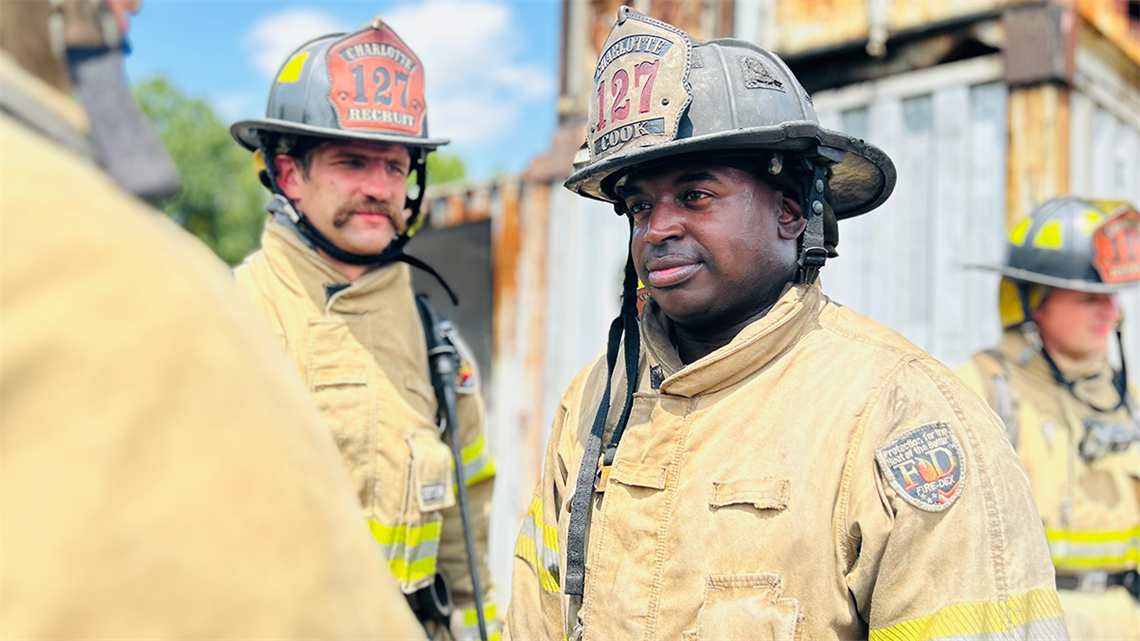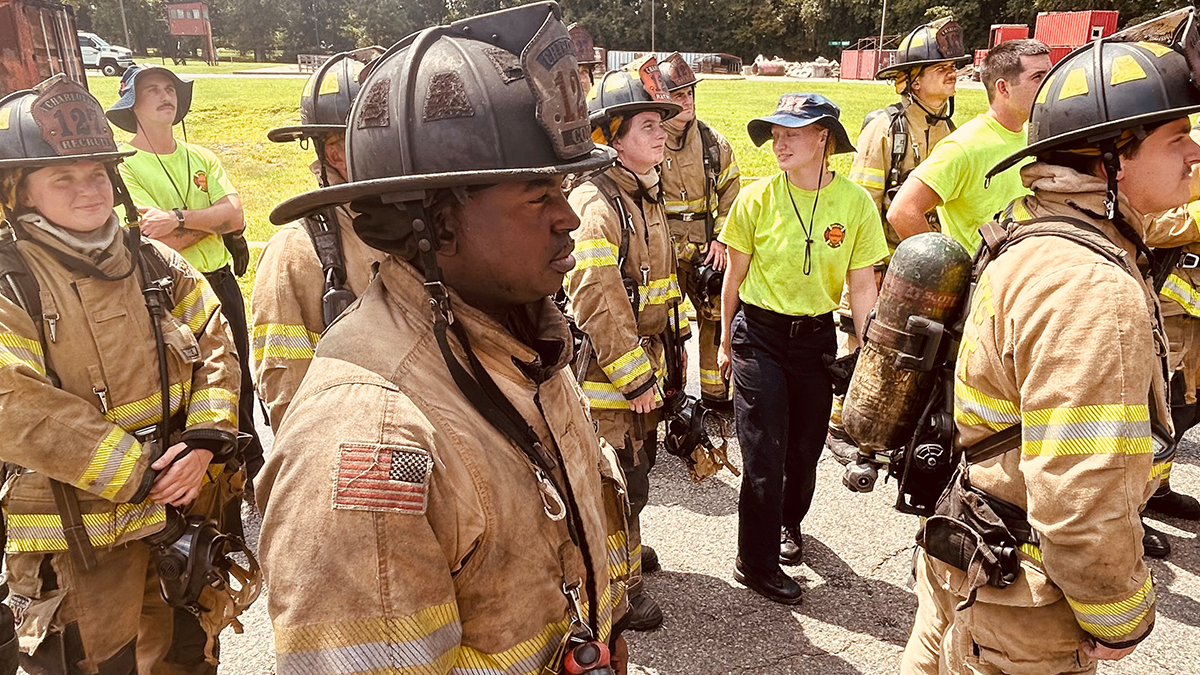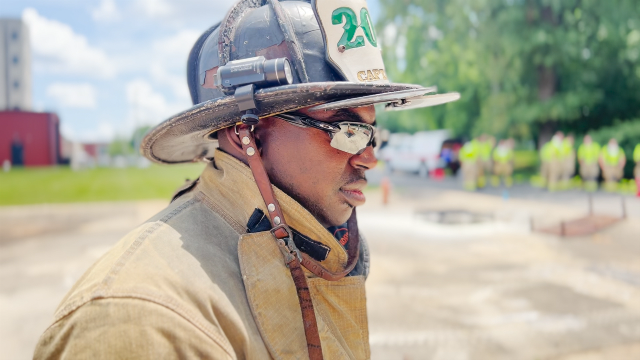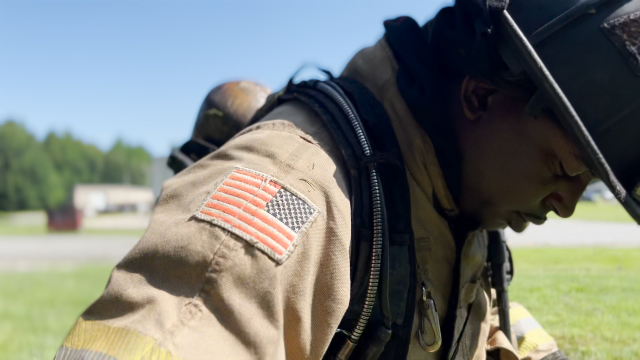Charlotte Fire’s Capt. Jason Cook: A Pillar of Training and Mentorship
Published on August 26, 2024

By Kevin Campbell
The camaraderie and dedication of firefighters are legendary, but for Capt. Jason Cook of Charlotte Fire, these elements are more than just words—they are the cornerstone of his approach to training Recruit Class 127. As the training captain, Cook has been instrumental in shaping the newest batch of recruits, guiding them through a rigorous, transformative journey that turns novices into capable firefighters ready to serve the community.
A Journey Begins
“Training Recruit Class 127 has been incredible,” Capt. Cook shared, reflecting on the progress his recruits have made. “It’s cool seeing people come in on their first day, seeing their class, and not really knowing each other. Everybody’s kind of nervous, and then seeing everybody form and gel together because, at the end of the goal, everybody wants to graduate.”
Cook’s enthusiasm is palpable as he discusses the early days of training. Recruits, some with prior experience and others completely new to firefighting, enter the program with a mix of apprehension and excitement. Under Cook’s watchful eye, they begin to find their strengths and address their weaknesses, learning not just from the structured curriculum but also from each other.

Captain Cook with his recruit class at the Charlotte Fire Training Academy.
Building Skills and Confidence
“We have a structured way that we do stuff,” Cook explained. “People get broken down and kind of built back up as to how we do things. We have different ways, different operating guidelines that we go by. The experience that they have from where they came from is very valuable in helping them conform to what we need and what we want them to be.”
One of the most rewarding aspects for Cook has been witnessing the tangible progress of his recruits. Tasks that initially seemed daunting, like tying complex knots essential for rappelling, become second nature over time. This transformation is not just about acquiring technical skills but also about fostering a sense of confidence and camaraderie among the recruits.

Capt. Cook guides his recruits through extinguisher training.
The Emotional Investment
Capt. Cook’s dedication to his recruits extends beyond the training ground. “I have a wife and I have two kids—a four-year-old and a two-year-old—but now, until November 8th, I have 24 more kids,” he said with a smile. “I feel responsible for everything they do, their happiness, their sadness. If they have issues, they come to me, and I’m there to help them with whatever they need.”
This paternal approach underscores Cook’s commitment to his role as a mentor and leader. He sees his recruits not just as future firefighters but as individuals whose well-being and growth he is deeply invested in. This commitment is evident in his willingness to address their concerns, support their progress, and ensure they are fully prepared for the challenges they will face in the field.

Capt. Cook on the training grounds in Gastonia.
The Rigors of Training
“Our biggest thing is to prepare,” Cook emphasized. “You don’t know what you don’t know, and when you get to the point that you know everything, you need to stop doing whatever you’re doing. So, we always have to train. This week here for safety and survival is exactly what it is. We put people in bad situations, so they figure out how to get out of it. This is all live fire, live heat. It’s really tough on the recruits.”
The intensity of the training regimen is designed to push recruits to their limits, ensuring they can handle real-life emergencies with competence and composure. Cook’s approach is rigorous but fair, always aiming to prepare his recruits for the unpredictable and often dangerous scenarios they will encounter as firefighters.

Capt. Cook views his recruits like they are his family.
A Family Forged in Fire
“I mean, at the end of the day, we are a big family,” Cook reflected. “We see a lot of stuff we shouldn’t see. We have to depend on each other. There’s a lot of mental health aspects that go into it. The only way you’re going to make it through is with like-minded people who can relate to what you’re doing.”
This sense of family was poignantly highlighted early in the training when the class faced the loss of a member’s loved one. Cook seized this moment to reinforce the bonds of family among the recruits. “I told them, everybody wants to be a family. Now it’s time to be a family,” he said. The class rallied together, supporting their grieving comrade and demonstrating the strength of their newfound unity.
Ready for the Streets
“I’m 100% certain that they’re ready to go,” Cook stated confidently. “This school here, safety and survival, just proves it. There’s no option when you go out to the street where I’m not going to let somebody go out unless they’re ready.”
Cook’s assurance comes from his comprehensive training program and his close monitoring of each recruit’s progress. He knows that the community’s trust in the fire department is paramount, and he instills this sense of responsibility in his recruits. “When someone calls 911, they’re expecting us to be there and be at our best. It doesn’t matter if we’re sick or have stuff going on at home. When 911 calls, we’re expected to fix it.”

Survival week training for his recruit class is one of the most important sessions of the program.
Leaving a Lasting Impact
Reflecting on his role, Cook drew inspiration from his own training days. “Whenever I came through, I still remember my training officer, Billy Griffin, and the impact he had on the class. My main goal for coming down is I feel like I wanted to have that impact on the class. Somebody that you can just lean on, ask questions, and advocate for you.”
Cook’s dedication to his recruits is evident in his commitment to their success and well-being. He pushes them to their limits, knowing that the rigorous training will prepare them for the realities of firefighting. His impact on Recruit Class 127 will undoubtedly be long-lasting, shaping not only their careers but also their lives.

Cook’s class is scheduled to graduate in November.
The Final Stretch
As the training period nears its end, Capt. Jason Cook looks forward to seeing his recruits graduate and join the ranks of the Charlotte Fire. “I’m proud of these folks, absolutely, 100%,” he said. “Just seeing people progress from the first day coming in, not knowing each other, to now being able to lean on each other in safety and survival school—it’s been a cool process.”
Capt. Cook’s journey with Recruit Class 127 is a testament to the power of mentorship, dedication, and the unbreakable bonds forged in the fire service. His story is one of commitment to excellence and unwavering support for those who will carry forward the noble tradition of firefighting in Charlotte.
This November, Recruit Class 127's graduation will be streamed live on the GOV Channel and the City of Charlotte's YouTube channel.